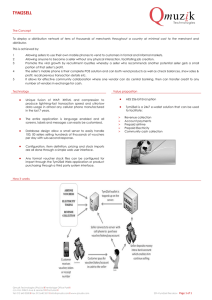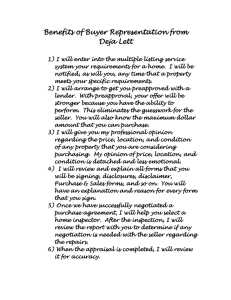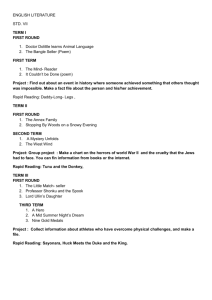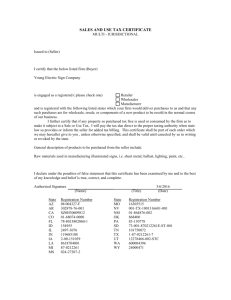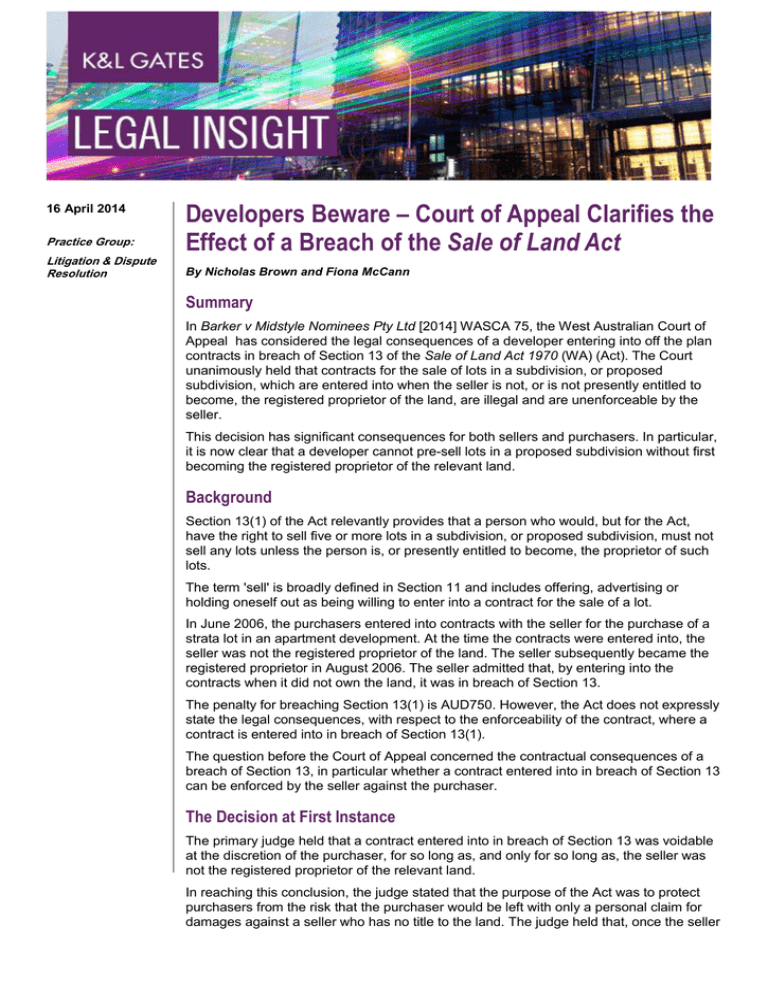
16 April 2014
Practice Group:
Litigation & Dispute
Resolution
Developers Beware – Court of Appeal Clarifies the
Effect of a Breach of the Sale of Land Act
By Nicholas Brown and Fiona McCann
Summary
In Barker v Midstyle Nominees Pty Ltd [2014] WASCA 75, the West Australian Court of
Appeal has considered the legal consequences of a developer entering into off the plan
contracts in breach of Section 13 of the Sale of Land Act 1970 (WA) (Act). The Court
unanimously held that contracts for the sale of lots in a subdivision, or proposed
subdivision, which are entered into when the seller is not, or is not presently entitled to
become, the registered proprietor of the land, are illegal and are unenforceable by the
seller.
This decision has significant consequences for both sellers and purchasers. In particular,
it is now clear that a developer cannot pre-sell lots in a proposed subdivision without first
becoming the registered proprietor of the relevant land.
Background
Section 13(1) of the Act relevantly provides that a person who would, but for the Act,
have the right to sell five or more lots in a subdivision, or proposed subdivision, must not
sell any lots unless the person is, or presently entitled to become, the proprietor of such
lots.
The term 'sell' is broadly defined in Section 11 and includes offering, advertising or
holding oneself out as being willing to enter into a contract for the sale of a lot.
In June 2006, the purchasers entered into contracts with the seller for the purchase of a
strata lot in an apartment development. At the time the contracts were entered into, the
seller was not the registered proprietor of the land. The seller subsequently became the
registered proprietor in August 2006. The seller admitted that, by entering into the
contracts when it did not own the land, it was in breach of Section 13.
The penalty for breaching Section 13(1) is AUD750. However, the Act does not expressly
state the legal consequences, with respect to the enforceability of the contract, where a
contract is entered into in breach of Section 13(1).
The question before the Court of Appeal concerned the contractual consequences of a
breach of Section 13, in particular whether a contract entered into in breach of Section 13
can be enforced by the seller against the purchaser.
The Decision at First Instance
The primary judge held that a contract entered into in breach of Section 13 was voidable
at the discretion of the purchaser, for so long as, and only for so long as, the seller was
not the registered proprietor of the relevant land.
In reaching this conclusion, the judge stated that the purpose of the Act was to protect
purchasers from the risk that the purchaser would be left with only a personal claim for
damages against a seller who has no title to the land. The judge held that, once the seller
Developers Beware – Court of Appeal Clarifies the Effect of a Breach
of the Sale of Land Act
has title, the risk to the purchaser is eliminated and the mischief to which Section 13 is
directed is eliminated.
The purchasers appealed.
The Court of Appeal
In allowing the appeal, the Court held that, when a seller enters into a contract with a
purchaser for the sale and purchase of a lot, and is not, or is not presently entitled to
become, the registered proprietor of the land, the contract is illegal and unenforceable by
the seller. In reaching this conclusion, the Court made the following observations in
relation to the purpose of the Act:
the prohibition in Section 13(1) is directed to a would-be seller and expressly prohibits
the making of a contract or acts that are essential to its formation. If a seller enters
into a contract in contravention of Section 13(1), the contract is illegal as formed. That
express prohibition cannot be transformed, by construction, into a prohibition against
the seller enforcing the contract, once it becomes the registered proprietor
the prohibition in Section 13(1) operates to protect a would-be purchaser from the risk
that the seller may be unable to transfer title to the purchaser, in accordance with the
contract, on the settlement date – a purchaser may be unaware of such a risk when
he or she enters into the contract
in enacting Section 13(1), Parliament intended to forbid a would-be seller, who is
engaged in a relatively large subdivision project, from conferring a right to purchase or
agreeing to sell in circumstances where it was not the proprietor of the land. In this
regard, the extent of Parliament's concern to forbid such conduct is apparent from the
broad definition of 'sell' in Section 11
a would-be seller who contravenes Section 13(1) commits an offence, the penalty for
which is a AUD750 fine. This modest penalty, which has not been altered since 1970,
did not indicate that Parliament intended a contract entered into in breach of Section
13(1) should be unenforceable by a seller only while the seller was not the registered
proprietor of the land. The preferable and correct view was that Parliament intended
that a contract in breach of Section 13(1) should be unenforceable by the seller
without any limitation or qualification.
Having considered the purpose of the Act, the Court found that the purpose would not be
advanced if a seller could enforce contracts made in breach of Section 13(1) if the seller
subsequently became the proprietor of the land. The Court also observed that, if Section
13 operated in the manner set out by the primary judge, a developer, who was
speculating in a proposed subdivision, may be encouraged to pursue the mischief which
Parliament was seeking to prevent.
The Court also held that the Act does not confer on a purchaser a right to rescind or
avoid a contract on the ground that the seller entered into the contract in breach of
Section 13(1).
The Court concluded that the contracts:
were enforceable by the purchasers, but were unenforceable by the seller
remained unenforceable by the seller upon it becoming, and after it became, the
registered proprietor of the land.
2
Developers Beware – Court of Appeal Clarifies the Effect of a Breach
of the Sale of Land Act
Observation
This decision has significant consequences for both sellers and purchasers. In particular,
it is now clear that a developer cannot pre-sell lots in a proposed subdivision without first
becoming the registered proprietor of the relevant land.
It was previously the practice for developers to obtain sufficient pre-sales in order to
obtain finance for the development. It appears from the Court of Appeal's decision that
developers will no longer be able to engage in such conduct.
In circumstances where a contract for the purchase of a lot in a subdivision, or proposed
subdivision, is entered into in breach of Section 13, a purchaser may elect to enforce the
contract. However, the contract cannot be enforced by the seller.
Authors:
Nicholas Brown
nicholas.brown@klgates.com
+61.8.9216.0928
Fiona McCann
fiona.mccann@klgates.com
+61.8.9216.0935
Anchorage Austin Beijing Berlin Boston Brisbane Brussels Charleston Charlotte Chicago Dallas Doha Dubai Fort Worth Frankfurt
Harrisburg Hong Kong Houston London Los Angeles Melbourne Miami Milan Moscow Newark New York Orange County Palo Alto
Paris Perth Pittsburgh Portland Raleigh Research Triangle Park San Diego San Francisco São Paulo Seattle Seoul Shanghai
Singapore Spokane Sydney Taipei Tokyo Warsaw Washington, D.C. Wilmington
K&L Gates practices out of 48 fully integrated offices located in the United States, Asia, Australia, Europe, the Middle East and
South America and represents leading global corporations, growth and middle-market companies, capital markets participants and
entrepreneurs in every major industry group as well as public sector entities, educational institutions, philanthropic organizations
and individuals. For more information about K&L Gates or its locations, practices and registrations, visit www.klgates.com.
This publication is for informational purposes and does not contain or convey legal advice. The information herein should not be used or relied upon
in regard to any particular facts or circumstances without first consulting a lawyer.
©2014 K&L Gates LLP. All Rights Reserved.
3

